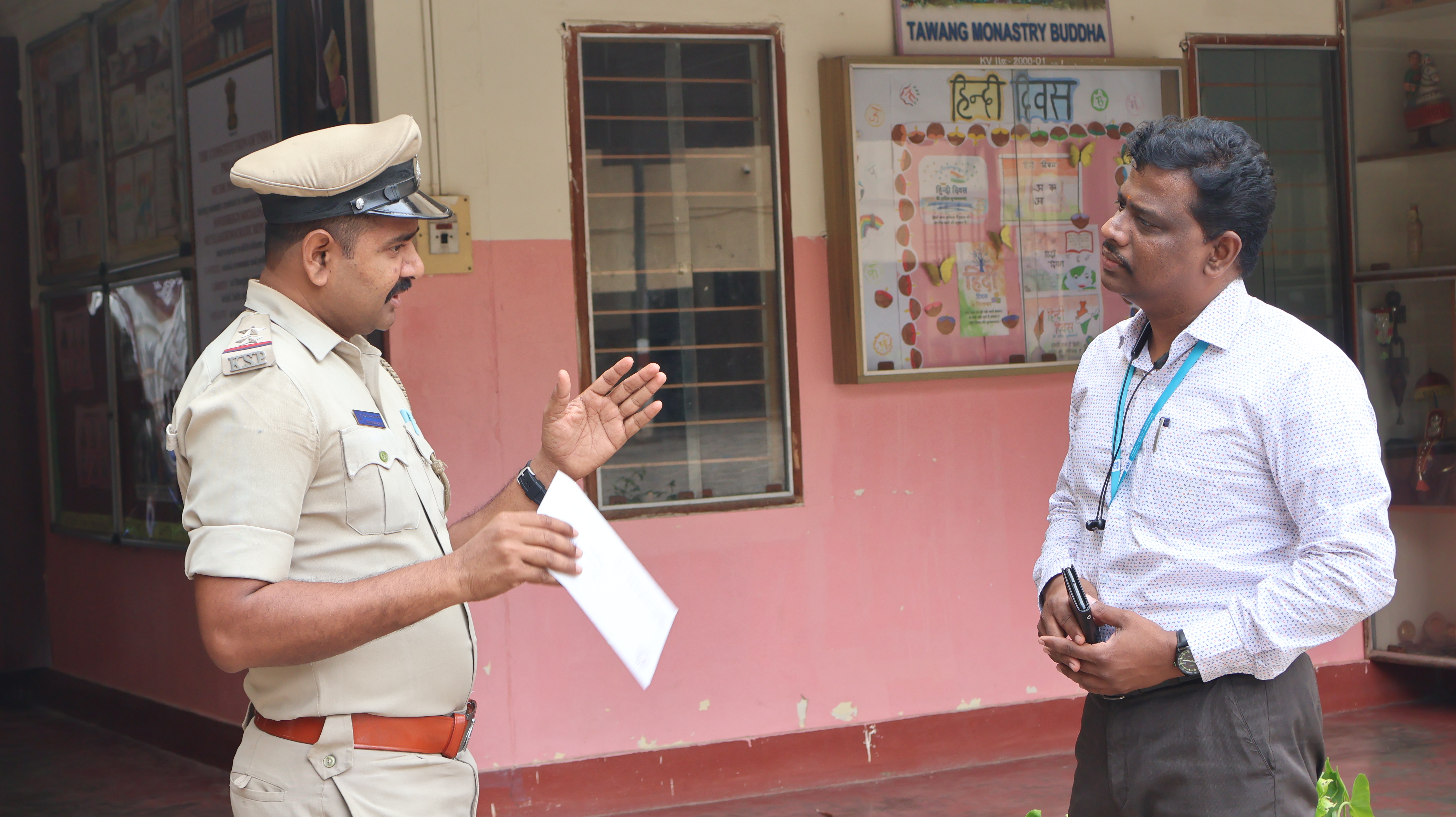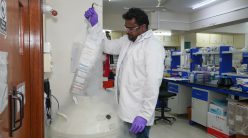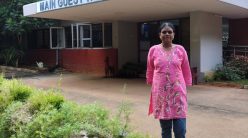A day in the life of Security Officer K Jayaraj

K Jayaraj usually begins his day around 9 am. But this October morning, an unexpected call prompts him to rush out the door an hour earlier. He tells his wife that there is an emergency and that their kids’ school is cancelled today. He quickly drives to the Kendra Vidyalaya on the IISc campus and alerts the school staff to evacuate the children from the premises. A team of police headed by Inspector Ajay Sarathi from the Yeshwanthpur police station also reach the school. Jayaraj spends the next few hours managing the situation with due diligence.
It is almost 10 am by the time the situation is settled. Another crisis averted. He finally sets off towards the security office on campus in a Bolero, fielding multiple calls on the way. Once he reaches his office, his usual day begins.
The security office is at the end of Tala Marg on the east side of the campus, right next to the Department of Design and Manufacturing (DM). The Security Control Room operates 24×7 and attends to all emergencies on campus. It has 10 security assistants and around 450 security personnel, including 30 women who work at the women’s hostels, a few security supervisors, and CCTV operators. Jayaraj is in charge of all of them.
Born in Tirukoilur and hailing from Villupuram in Tamil Nadu, Jayaraj completed his Bachelor’s in computer science from Annamalai University and MBA from Pondicherry University. Following this, he worked in the Central Reserve Police Force (CRPF) for about eight years, travelling across India from Agartala to Ranchi, Hyderabad, Mudkhed, and Neemuch. Recalling his initial days in Agartala, he says that the police department had once procured new computers, and kept them in brand new boxes. “No one dared to touch them as they were all afraid of accidentally breaking them.” With his computer science background, Jayaraj helped the commanding officers set up the systems, connect to the internet, and train the staff members.
‘Managing the security of an institute like IISc is all about balance’
After his stint at CRPF, Jayaraj joined the India Tourism Development Corporation (ITDC), overseeing human resources and security at Janpath Hotel in New Delhi. After he was relieved from the Human Resource Management Division at ITDC, he took evening classes at the University of Delhi to get his Bachelor of Laws (LLB). He joined IISc in 2019 as an Assistant Registrar in charge of security and students’ hostels.

Jayaraj’s office is a rectangular room with a barrel roof and multiple windows. There are two desks: one with a small pile of documents and two telephones, and the other with a bookshelf, a cricket trophy, and a few knickknacks. A desktop is in one corner of the room with a rifle hanging on the wall next to it. Once Jayaraj settles in, he answers a few more phone calls and then jots down the morning incident in a logbook.
At any given time, around 100-110 security personnel guard IISc; some are stationed at the entrances, departments, and hostels, while others patrol the campus. Jayaraj uses a walkie-talkie to communicate with the guards throughout their shift. “The shifts and posts keep on changing,” Jayaraj explains. Every week, each security guard has two morning, two evening, and two night shifts, with one day off-duty, and their placements also change every 10 days.
Managing the security of an institute like IISc is all about balance, says Jayaraj. Educational institutions are soft targets for threats and attacks. “We have our unique challenges,” he says. As an example, he mentions people who look for opportunities to steal laptops or phones during conferences, for which screening at the gate becomes essential. “Irrespective of the complaints we get, we focus on the grey areas where there is scope for improvement.” Which is why the security office conducts a mandatory 40-minute briefing session before each shift change.
He pauses to listen for any skirmishes outside. Sometimes, he says, people drop by the security office to complain about being stopped at the gates; as the guard placements are changed every 10 days, the new guard asks anyone entering ‘Who are you?’ The word people often use to complain about the security guards is ‘harassed,’ Jayaraj explains. “For doing their basic job. The guards are paid for that.”
However, Jayaraj also agrees that the topic is sensitive, and guards at the gates have to be careful while talking to visitors who enter the Institute.
After the logbook entry, Jayaraj signs a few documents for Eresh, the administrative assistant in the security office. Then, he moves to the desktop to check his emails. He also makes sure to charge his phone, as its battery has dwindled down to a mere 13% in less than half the day. “My battery dies very fast because of the continuous usage,” he remarks.
The security office often gets calls from residents and students about the behaviour of various dogs, monkeys, snakes, and even the elusive slender loris. “Our Institute believes in inclusive living,” Jayaraj says. Some of the security staff are trained to climb trees and return the fallen slender loris to its home atop the branches. Others are trained to identify and catch non-venomous snakes.
Some security staff are trained to climb trees and return the fallen slender loris to its home atop the branches
The office also handles emergencies and unfortunate deaths. In the case of student deaths, the security office provides full support to the family, coordinating with them every step of the way till they go back home. Jayaraj says that these parents keep in touch and call him to talk about their kids. “It is painful and challenging but it is a part and parcel of this occupation,” he says. Since his joining, Jayaraj has attended many such cases and some near misses. It is these near-miss cases, Jayaraj says, that give him strength and energy to continue his work.
On a lighter note, a major complaint the security office often receives is about bicycles, Jayaraj says. The office gets 2-3 calls daily regarding misplaced or stolen bicycles – the calls are so frequent that the students are told to keep their bicycle-related bills and documents handy during orientation. And in an interesting twist, about 99% of them are recovered from within the Institute. “Sometimes, students forget where they parked their bicycles,” he comments.
The day gets busy again as Jayaraj gets a call from the Registrar asking for support on a staff matter. Then, two members from IISc’s Students Council drop by to ask questions regarding Diwali celebrations on campus. Jayaraj advises them on the protocols that need to be followed to ensure student safety.
It is 1 pm now and Jayaraj walks to the front of the security office where the next batch of security guards are standing in line for their briefing. After they salute, he begins his briefing by telling them that it is almost Diwali and they need to stay vigilant. “Wherever you are posted, be on alert.” He tells the guards to check every person entering the Institute and to ask the drivers to go slow. “You are all working at IISc – the number one university in India. You also need to be the best because your job is important. Understood?”
The other officers take attendance as Jayaraj goes to meet the Dean of Administration and Finance. They brief the other guards and the women security guards in charge of the hostels separately, giving them a run-down of the events for the day. The security in charge of hostels and messes are also briefed about taking care when talking to students. One of the security officers tells them, “We might not know what the students are going through. But for them, you are the guardian here. So, talk to them politely.”
Jayaraj then drops by his home on campus to have lunch – rice, sambar and kuzhambu. He then goes to check on the hostels and reaches the office around 2.30 pm.
Sometimes he gets reports of student injuries and accidents. In these cases, Jayaraj first calls the Health Centre to understand if any students visited for a checkup.
He recalls the initial days of the COVID-19 lockdown when the entire campus was shut to outsiders and the security office never received any complaints of theft. “The Institute handled COVID-19 very well.” As part of the COVID-19 committee, Jayaraj regularly sent bulletins to the IISc community regarding quarantine areas and updated guidelines. The security office arranged meals for over 800 students who stayed on campus. They also got police passes for the essential staff who travelled to the Institute daily. During the second wave, the officers helped set up quarantine rooms for the students who were infected. From mattresses and bed sheets to pillowcases and internet dongles, the security office provided all the amenities to the students.

Cybercrimes are a growing issue about which the security office also receives complaints from campus residents. DIGITS has awareness programmes and sends posters and emails to let the IISc community know about these crimes and what steps to take if anything happens. Jayaraj stresses on how letting the security office know immediately helps in such situations. This also gives the police more time to track down such operations.
‘We might not know what the students are going through. But for them, you are the guardian here. So, talk to them politely’
Another responsibility that the security office handles is securing the campus during a high-profile visit from any ministry or the Prime Minister. There are different categories of security, Jayaraj explains, with the Special Protection Group (SPG) being the highest level of security that protects the PM. Nonetheless, all these agencies have their own protocol that they follow to secure the campus and buildings during a visit.
Around 4 pm, a few security guards along with the guard in charge of the campus football grounds walk into Jayaraj’s room. Someone has filed a complaint that outsiders were let into the ground. Jayaraj listens to the story, asks the guard a few questions, and lets him go. After giving it some thought, he tells them to suspend the guard for two days. Jayaraj says that security lapses are taken seriously. “There is no compromising on discipline.”
As first responders, Jayaraj believes that security personnel should be prepared for emergencies. One of the security vans is equipped with emergency kits, Jayaraj explains. “We have a chemical spill kit, bodysuits for fire emergencies, and oxygen cylinders.”
Jayaraj usually leaves office around 6 pm and goes for another round of security checks before heading home. After reaching home, he doesn’t immediately get out of his work clothes. Sometimes, his kids and wife pester him about it. “But, you know, if there is an emergency, this will save my time,” he says. “‘Be Ready’. That is our motto.”




